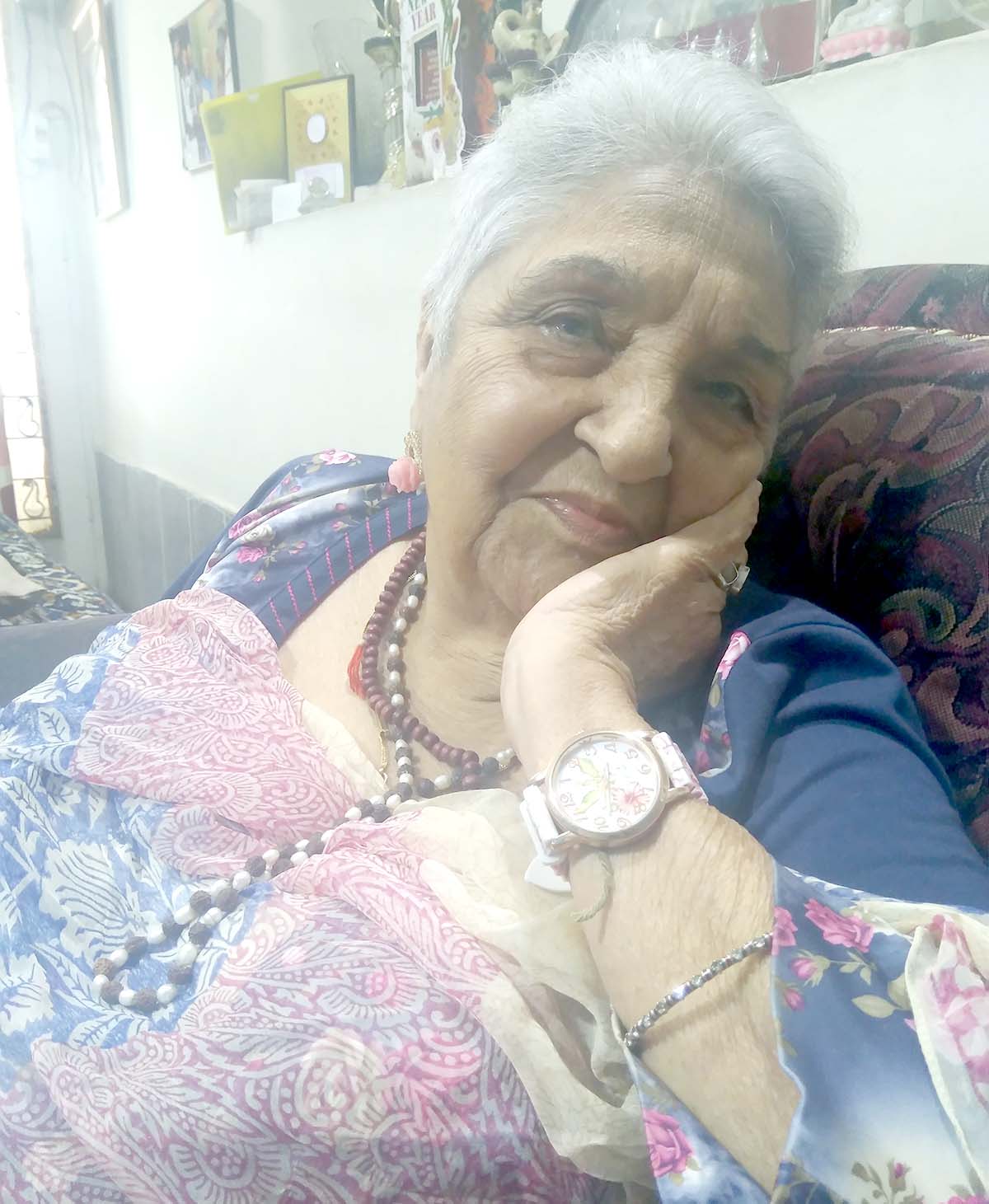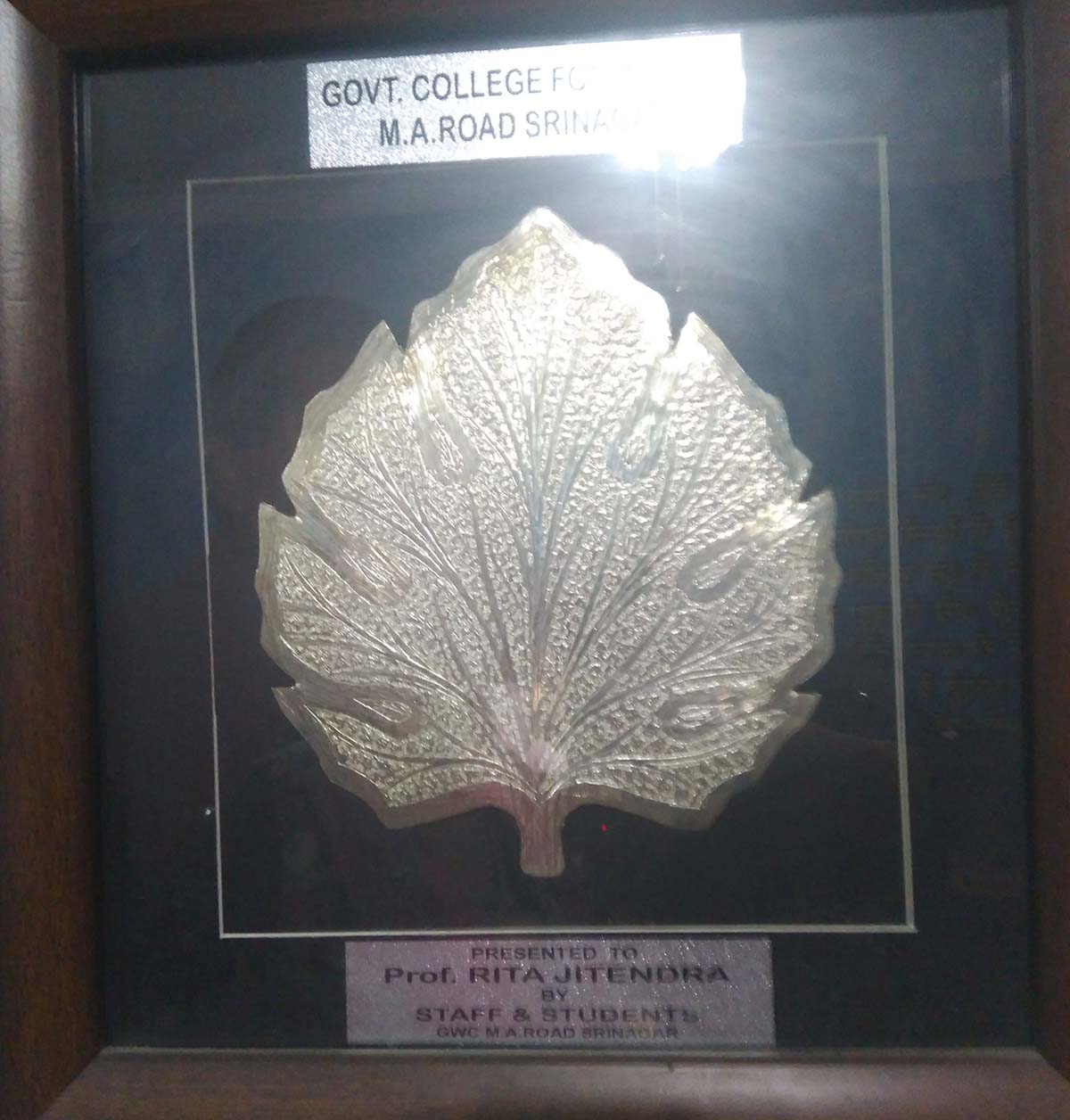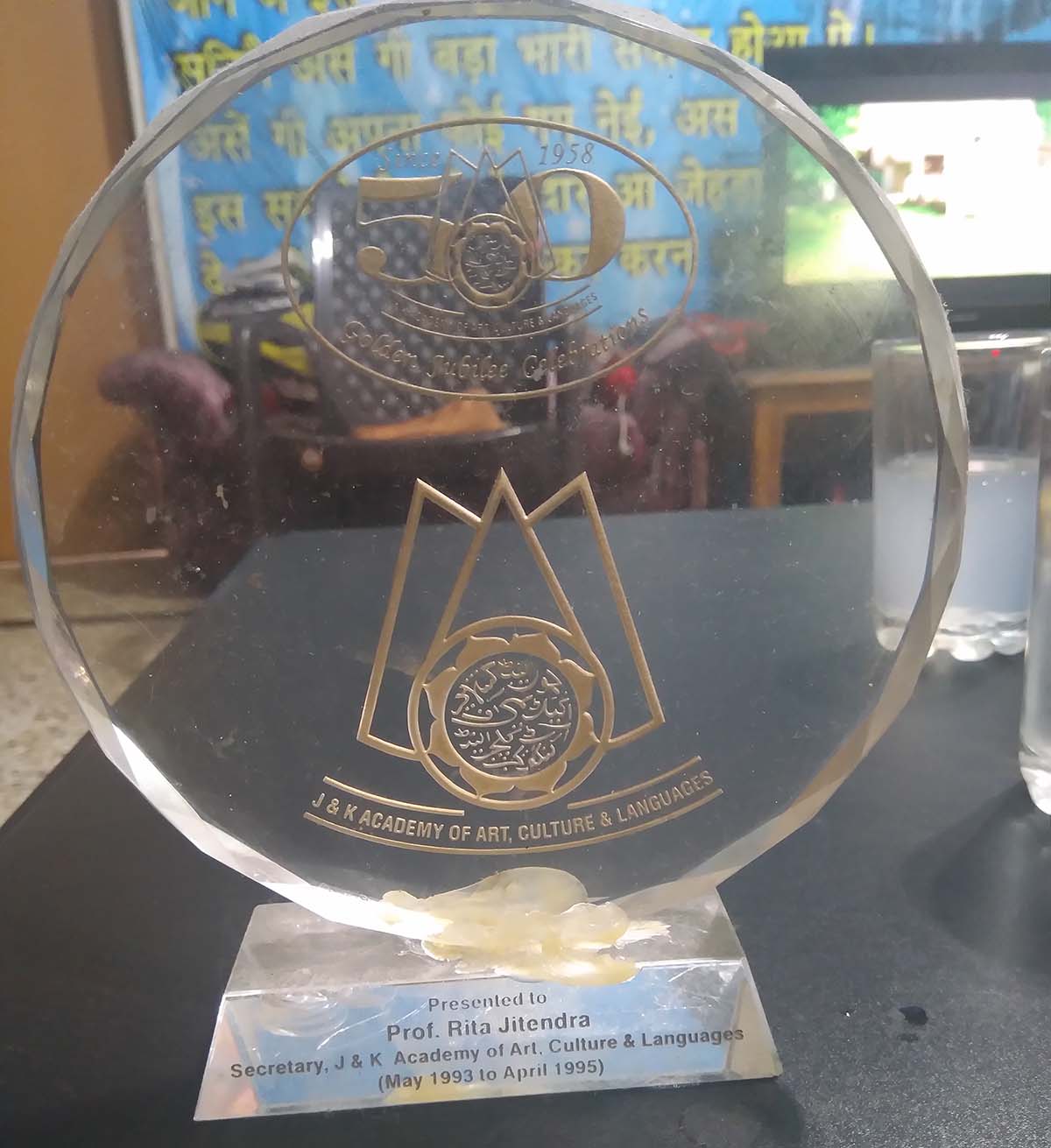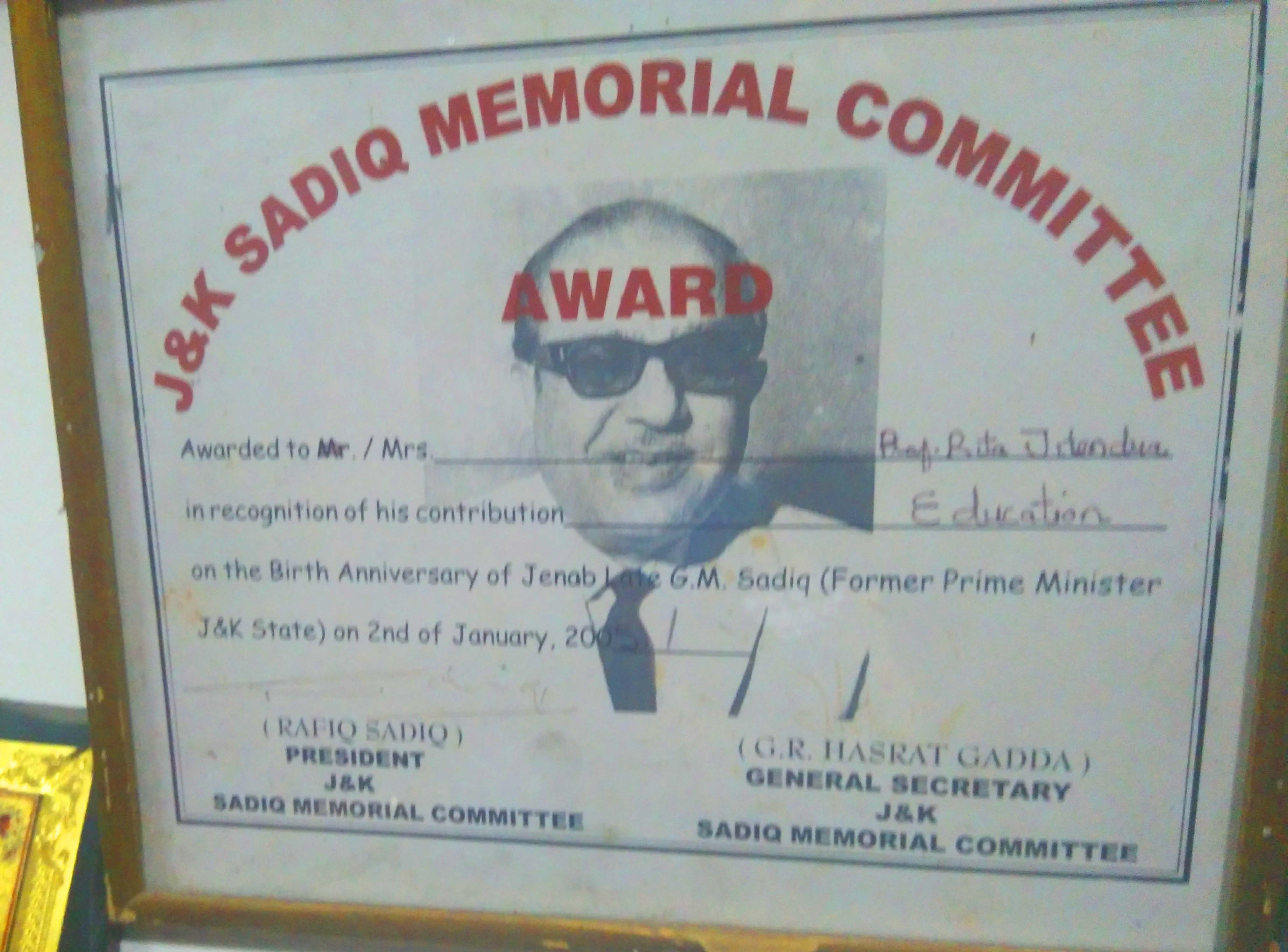Prof Rita Jitendra was talking about her literary contributions live on Doordarshan’s Good Morning Kashmir that she suffered cardiac arrest and was declared ‘brought dead’ by the doctors at SHMS Hospital. Barely a few days before her demise, the Dogri literary scholar had talked to Pallavi Sareen. Excerpts from the interview

KASHMIR LIFE (KL): How did you begin your journey as a radio artist?
RITA JITENDRA (RJ): When I was barely 11, I went to a radio station and saw a woman performing a drama on radio. I got so curious. She was the woman I learned from. Those days, the drama didn’t use to be theatre. There was no TV, either. There just used to be Radio. That was 70 years ago and I joined Radio as an artist 67 years ago. That woman was Adelene Ruhi, a beautiful woman, in the way that she lacked pettiness and jealousy. She taught me how to speak on the radio. She was the daughter of a priest in the Church near the Kashmir Times office on Residency Road. We did so many radio programmes together. Our common interests and our concerns for humanity and womanhood blossomed into a friendship until she died. I always wanted to tell people the story of my mentor and a beloved friend.
KL: Then how did you get into playwriting and theatre direction?
RJ: There used to be no institutions or a drama school. We graduated into the art while performing for the radio. I didn’t know where to get the script from, so I started writing myself. I worked with an all-female team without male characters in the play. It was a female artist wearing a suit to perform as a male. So we never got first prize. Once, I asked judges why weren’t we getting any prize and they said: ‘It is not the Ramleela era anymore’. That is when I started writing plays with all-female characters and won first prize three times consecutively. I wrote on many social themes. I wrote Beti Bachao in 2000, Modiji said it in 2014. Jagmohan saw and really appreciated it.
KL: You were the only female Secretary of Jammu and Kashmir Arts and Culture Academy?

RJ: I was the secretary of the Academy when militancy was at its peak in the valley. I never wanted that post. I had refused it twice and even my husband warned me from taking up the position. I didn’t wish to go to the valley and operate in dangerous circumstances. People before me had actually shut it down. I was told that I could operate from wherever I wanted and didn’t need to go to the valley or Ladakh. I myself was so hesitant about going to Ladakh because I thought I would have breathing issues. They used to pay three times more than routine for a show in Ladakh. But I said, I love my voice and if something happened to it, it would kill me. Still, when I became the secretary, I was brave and bold. I did go to Ladakh and they wrote a letter to the Governor appreciating my gesture.
KL: How did you get into social work?
RJ: As a kid, when I saw our domestic servant press my mother’s feet, I suggested him to study more and he felt encouraged and left the job. My parent would get mad at me that I made the servants quit. Even in my family with the male-dominant mentality, I would get upset when my father would yell at my mother. I would go to her and ask: “Aapne acche wale daddy se shaadi kyu ni ki?” (Why didn’t you get married to a good man?) So, the cause of women has always been close to my heart. When somebody would ask me to deliver a lecture or talk about women empowerment, I do it happily. The way things are today, especially eve-teasing, it is terrible. Our times were better. Eve teasing existed even then, but not to the extent where someone would throw acid on a girl or traumatize her.
KL: Were your parents supportive of your love for art and radio?
RJ: My father was an orthodox Kashmiri Pandit; it was a big deal that I was even allowed to perform in Radio. I am a Kashmiri Pandit and not a Dogra born but I worked all my life for the Dogra land. My mother supported me. My parents were hesitant about me getting married to Jitendra Khajuria but they finally agreed. My husband was intellectually very bright, and a year after, we got married, my father said that I was right in the decision making.

While honouring him, the Government of India said: “A person with equal knowledge of Dogri and Urdu.”
I have a desire to start an award in his name for humorous production and drama. Not everyone can write humour, there’s a rhythm to it. He got many awards for humour. He used to make people laugh very madly. I was discussing the award with a cultural organization just before you came in and they tell me it is a great idea. They suggested an award with Rs 11000 as prize money but I will keep it for more. It has been nine years since he died and his works are still getting published. He was a brilliant writer and an intelligent man.
KL: What were your school and college experiences like?
RJ: In 1954, the Government College Parade came into existence. I was in BA-III. I used to study at Luthra Academy, where a hospital exists today, next to the Masjid in the Chowk. That used to be my house. I used to say mine and the God’s wall was common.
When the bell would ring, I would leave home. The distance was too short. There were only 14 girls in BA final. Failing in examinations wasn’t a shameful thing then. I was good at studies and sports. In GCW Parade, my name is on the 9th rank in the principal’s office. I used to be a topper and so I was told to lead. There was no Jammu University then. It was Jammu and Kashmir University. So, I came first in Arts in the entire state. I brought the first Yasho Rajya Lakshmi Gold medal to the college. For the next gold medal, I had to wait for half a century till 2005 which I got for education, culture, and social work.

KL: What do you study, more often?
RJ: I read a lot of Shayari. I have never formally learnt Urdu, and being a good radio listener, I refined my languages, English, Hindi, Urdu, just by listening. When you listen to a beautiful accent, you just cannot forget it. I write in Hindi, Urdu, and Sanskrit. I wanted to read our cultural literature in their original form, not in English translation. I don’t speak Dogri but I just did a show in Dogri on Doordarshan. Many people, mostly students, who ask me for correct pronunciation and tricks of learning languages, I tell them to just listen to a few Ghalib poems.
Right now, I am the senior most All India Radio artist in the country. Unlike me, some of my seniors are not active.
KL: What keeps you going? Do you not ever think of retiring?
RJ: I want to die with my shoes on. You get only one life and that is my desire. My three children are all earning four times I ever did and they dote on me, but I don’t want to be a burden on my children. I don’t want to fall sick and be taken care of. Such inactiveness would kill me. I want to keep working and performing until the end.
In fact, I idolize A P J Abdul Kalam, not only because he was a wonderful orator, the likes of which you don’t get to see in today’s time, but also because of the way he died.















